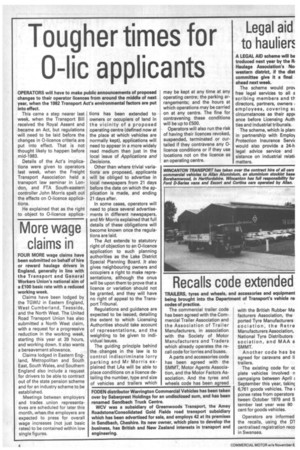Tougher times for Odic applicants
Page 4

If you've noticed an error in this article please click here to report it so we can fix it.
OPERATORS will have to make public announcements of proposed changes to their operator licences from around the middle of next year, when the 1982 Transport Act's environmental factors are put into effect.
This came a step nearer last week, when the Transport Bill received the Royal Assent and became an Act, but regulations will need to be laid before the changes in 0-licence criteria are put into effect. That is not thought likely to happen before mid-1983.
Details of the Act's implications were given to operators last week, when the Freight Transport Association held a transport law seminar in London, and FTA South-eastern controller John Morris spelt out the effects on 0-licence applications.
He explained that as the right to object to 0-licence applica tions has been extended to owners or occupiers of land in the vicinity of a proposed operating centre (defined now at the place at which vehicles are normally kept), applications will need to appear in a more widely read medium than just in the local issue of Applications and Decisions.
Other than where trivial variations are proposed, applicants will be obliged to advertise in local newspapers from 21 days before the date on which the application is made, and ending 21 days after.
In some cases, operators will need to place several advertisements in different newspapers, and Mr Morris explained that full details of these obligations will become known once the regulations are laid.
The Act extends to statutory right of objection to an 0-licence application to such planning authorities as the Lake District Special Planning Board. It also gives neighbouring owners and occupiers a right to make representations, although the onus will be upon them to prove that a licence or variation should not be granted, and they will have no right of appeal to the Transport Tribunal.
Regulations and guidance are expected to be issued, detailing the extent to which Licensing Authorities should take account of representations, and the weighting to be given to individual issues.
The guiding principle behind the changes in the law is to control indiscriminate lorry parking and Mr Morris explained that LAs will be able to place conditions on a licence detailing the number, type and size of vehicles and trailers which may be kept at any time at any operating centre; the parking arrangements; and the hours at which operations may be carried on at any centre. The fine for contravening these conditions will be up to £500.
Operators will also run the risk of having their licences revoked, suspended, terminated or curtailed if they contravene any 0licence conditions or if they use locations not on the licence as an operating centre.








































